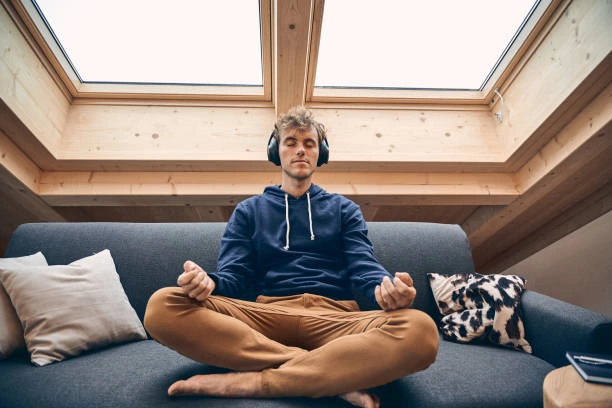Sleep Meditation: How to Do It
Since stress is a common obstacle to good sleep, it’s easy to see why sleep meditation helps so many people. Studies show that stress affects 77% of people to the extent that it impacts their physical health. Various types of meditation exist, each with its own methods and goals, but most aim to shift your focus to the present moment (practicing “mindfulness”) and help you manage stressful thoughts more effectively. Many studies have found that meditation benefits those dealing with insomnia, anxiety, chronic pain, jet lag, and symptoms of depression. So, what kind of meditation promotes better sleep? Let’s explore how sleep meditation works and how to practice it for the best results.
How Sleep Meditation Works
Research shows that meditation at night can support healthy sleep patterns by helping you feel more relaxed and calm before bed. According to the Sleep Foundation, “Meditation helps manage anxiety, stress, and sleep difficulties… It can promote sleep by reducing pain sensitivity and stress, both of which can interfere with sleep.”
When you practice sleep meditation, it changes brain activity in certain areas, such as the thalamus and amygdala, which play roles in your perception of fear and discomfort. Studies show that meditation can reduce symptoms of depression, pain, and worries/rumination, which often cause people to toss and turn when they can’t sleep.

Benefits of Sleep Meditation:
- Reduces Anxiety and Worry Whether you follow a guided meditation or meditate on your own, the practice can have a calming effect on your nervous system, helping to alleviate many anxiety symptoms related to insomnia. Several studies have found that mindfulness meditation can help adults with insomnia improve total wake time, sleep onset latency, sleep quality, and sleep efficiency.
In addition to focusing on your breath during meditation, you can try incorporating visualization, relaxing sounds, or music, all of which create a peaceful environment that makes it easier to relax. Some guided sleep meditations include these elements, helping you focus on the present, let go of rumination, and cultivate gratitude and positivity to counteract stress.
- Helps Relieve Pain and Discomfort Sleep meditation can also be a beneficial addition to your nighttime routine if you deal with ongoing pain. It may help ease pain, muscle tension, and even inflammation related to high stress levels. By focusing on acceptance and relaxation, you may find it easier to cope with discomfort that keeps you awake.
- May Help Manage Jet Lag While there’s not much research on this topic, some people find that sleep meditation can help them adjust to changes in sleep schedules, such as jet lag or other shifts in routine (e.g., shift work or parenting duties). This may be due to meditation’s ability to reduce worries, fatigue, and feelings of overwhelm, helping you focus more easily.

How to Practice Basic Sleep Meditation
For the best results, try meditating within an hour of going to bed. You can do this before bed, after getting into bed, or as part of a calming nighttime routine.
First, find a comfortable position, whether seated or lying down. As you take steady breaths, focus on your breathing—inhale to a count of four, then exhale to a count of four (this “four-by-four breathing” is also known as box breathing). Some people find breathing in through the nose and out through the mouth most soothing.
When your mind starts to wander, gently bring your focus back to your breath. Acknowledge your thoughts but try not to get caught up in the stories you begin telling yourself. Notice how your body feels and “breathe into” any areas that feel tense, heavy, or tight. Then, imagine your muscles softening and your body feeling calm and peaceful.
You might also want to incorporate journaling into your meditation practice by writing down your thoughts afterward. Journaling is a great way to “dump” your worries, leaving you feeling lighter.

Additional Tips
While meditation seems to help with sleep, it should not replace the need for healthy sleep habits. The goal is to create a restful sleep environment and get enough sleep on most nights—ideally seven to nine hours for most adults. If you struggle to sleep, try these additional habits alongside sleep meditation:
- Stick to a regular sleep schedule, going to bed and waking up at the same time each day to regulate your circadian rhythm.
- Make your bedroom conducive to sleep by keeping it cool, dark, quiet, tidy, and comfortable.
- Develop a relaxing bedtime routine. Avoid using electronic devices about two hours before sleep and instead try activities like reading, journaling, bathing, or stretching.




